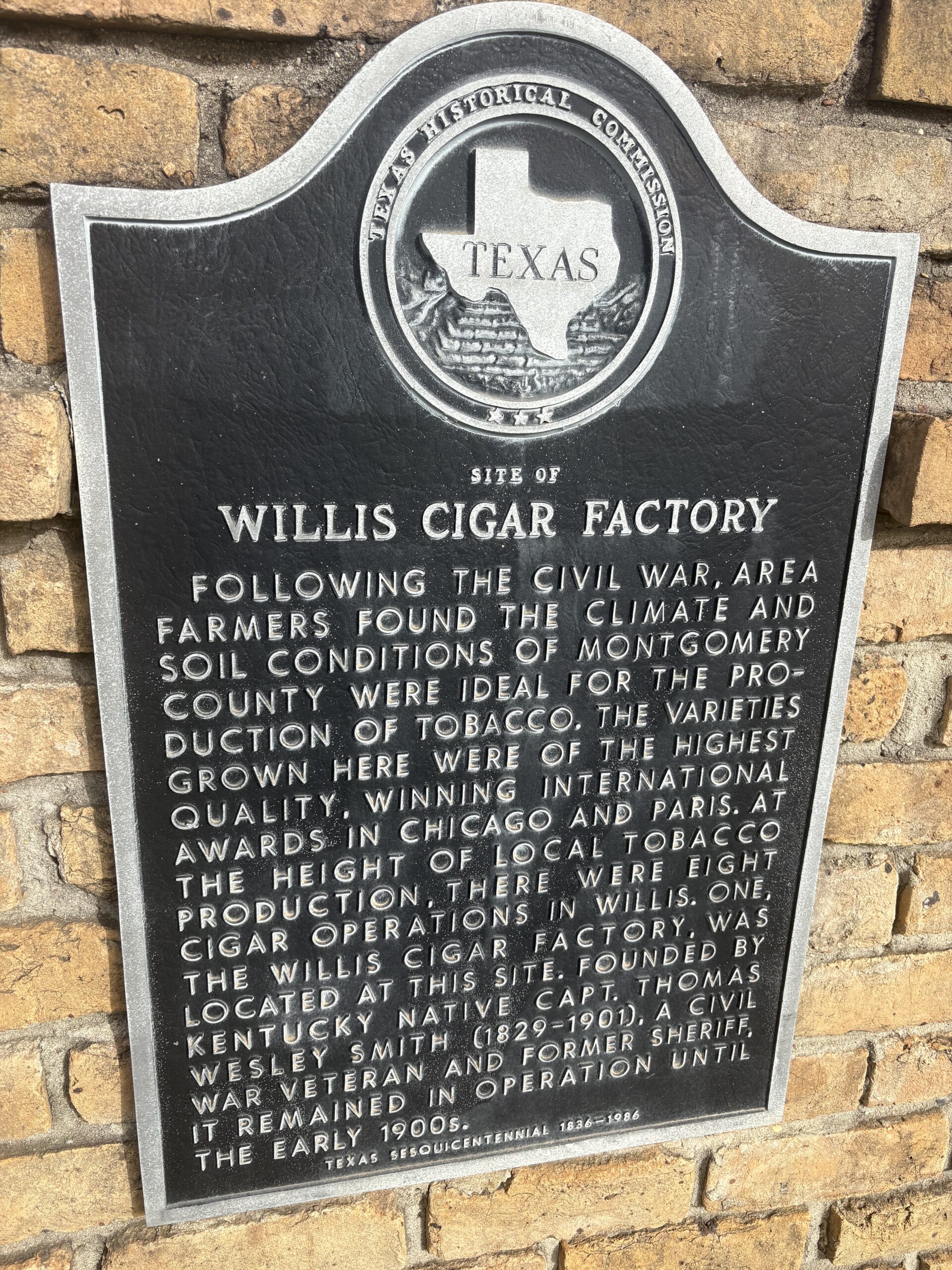The Willis Cigar Factory and Tobacco Boom: How This Historic Texas Town Became the Tobacco Capital of the Lone Star State

Introduction
The Texas Historical Commission marker at the Willis Cigar Factory site commemorates the booming tobacco industry that once flourished in Willis. Following the Civil War, local farmers discovered that the climate and soil of Montgomery County were ideal for tobacco cultivation. The varieties of tobacco grown around Willis proved to be of the highest quality, even earning international awards at expositions in Chicago (1893) and Paris (1900). This post-war tobacco boom put Willis on the map, transforming it from a small railroad stop into a bustling community hub with a growing population and economy.
Post-Civil War Tobacco Boom in Willis
In the late 1800s, Willis, TX became the center of Texas’s fledgling cigar industry. Farmers in the area, many of them former Confederate veterans and new settlers, seized the opportunity to grow premium tobacco. By the 1890s, Willis was producing up to 90% of all tobacco grown in Texas within just a five-mile radius of town. At the height of this boom, Willis boasted vast tobacco fields and as many as seven to eight cigar factories in operation.
For a frontier town of only a few hundred residents, this was an astounding burst of growth and prosperity. The quality of Willis’s tobacco was so renowned that it won first prize at the World’s Columbian Exposition in 1893 and again at the Paris World’s Fair in 1900—a point of immense pride for local growers.
This success fostered a spirit of entrepreneurship and optimism in Willis. One prominent example was Captain Thomas Wesley Smith, a Kentucky native, Civil War veteran, and former Montgomery County sheriff who founded the Willis Cigar Factory in the 1870s. Capt. Smith’s venture was one of the town’s earliest and most successful cigar operations. He reinvested in the community, using his profits to build an opera house in Willis as a center for culture and entertainment.
By 1895, the once-tiny railroad town had blossomed into a lively locale with amenities uncommon for its size—an opera house, a two-story college, multiple churches, and dozens of shops and businesses bustling with activity. Willis had truly become a community hub in Montgomery County, attracting workers, farmers, and their families in search of opportunity.
Willis Cigar Factory: A Community Cornerstone
The Willis Cigar Factory itself became a cornerstone of the local economy and identity. Housed in one of the first brick buildings in town, the factory employed dozens of residents, with one historical account noting a single cigar plant employing over 100 people at its peak. Neighbors could hear the buzz of activity as skilled cigar rollers crafted cigars from locally grown leaves.
The industry’s success even spurred friendly competition with nearby towns; at one point, Willis outpaced the larger town of Conroe in the “tobacco race,” solidifying Willis’s reputation as the “tobacco king” of Texas.
Local citizens took great pride in this prosperity. They invested in their town’s future by funding schools and even establishing the Willis Male and Female College in 1888—a coeducational institute built with funds raised by Willis residents themselves. Community events and social life thrived, with the opera house hosting performances and gatherings, and the railroad depot busy shipping out boxes of Willis cigars to far-off markets.
Many Texans began to recognize Willis not just as a dot on the map, but as a regional center of agriculture, commerce, and culture. The story of Capt. T.W. Smith and his cigar factory also exemplifies the tight-knit, supportive community spirit of Willis. As a war veteran and local leader, Smith’s involvement in business and civic life bridged generations. His factory remained in operation into the early 1900s, and during that time, he mentored others, including his son, who started his own cigar business.
From Boom to Bust – and Building Resilience
Like many boomtown stories, Willis’s tobacco era was grand but relatively short-lived. By the early 1900s, changing market forces brought this golden chapter to a close. After the Spanish–American War in 1898, the U.S. government lifted tariffs on Cuban tobacco imports, meaning Cuban cigars once again flooded the market. Practically overnight, Willis’s local growers lost their competitive edge.
The amount of tobacco under cultivation around Willis plummeted—dropping from about 1,000 acres at peak to just 70 acres by 1901 as farmers pivoted to other crops. Additionally, tobacco proved a challenging crop to cure and process in the Texas climate, and the cost of marketing Willis cigars against larger national brands was prohibitive. One by one, the cigar factories in Willis either closed or moved on. The Willis Cigar Factory site itself was abandoned by around 1910, and the brick building eventually succumbed to fire in the 1930s.
Yet, Willis did not become a ghost town after the tobacco boom collapsed. The momentum from those prosperous years helped the town transition into the 20th century with confidence. Locals had shown an uncanny ability to adapt and capitalize on opportunities while they lasted. After tobacco, Willis residents turned back to traditional endeavors like timber, cotton ginning, and livestock ranching—industries that had been there all along and now took center stage once more.
The railroad continued to ferry lumber and farm goods to market, keeping Willis relevant as a trading town. By the 1930s, an oil discovery nearby provided another economic boost, ensuring that the community would continue to grow and thrive through new avenues.
Moving to Willis, TX: Embrace a Town with History and Heart
For anyone moving to Willis, TX, the rich history of the Willis Cigar Factory and the tobacco boom is more than just a tale from the 1800s—it’s a reminder that Willis is built on perseverance, pride, and community. That same character endures today in the town’s festivals, local businesses, and warm welcomes to newcomers.
Whether you’re drawn by the appeal of Willis Texas history or the scenic lakes and forests nearby, you’ll be joining a community that values its past while looking forward to a bright future.
Ready to call Willis home? Reach out to the Red Hawk Property Team, powered by JLA Realty—the premier real estate team in Texas and the Willis real estate specialists serving home buyers, sellers, and investors. Our team is passionate about this community and its heritage. We’re here to answer your questions about real estate in Willis, TX, or Grand Republic Ranch, and help you find the perfect home where you can be a part of Willis’s ongoing story.
